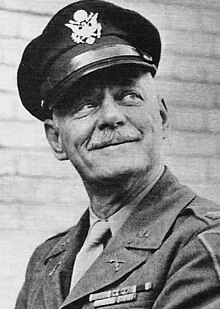Norman Schwarzkopf Sr.
| Norman Schwarzkopf Sr. | |
|---|---|

Schwarzkopf as an Army officer
|
|
| Birth name | Herbert Norman Schwarzkopf |
| Born |
August 28, 1895 Newark, New Jersey |
| Died | November 25, 1958 (aged 63) Mineola, New York |
| Place of burial | West Point Cemetery |
| Allegiance |
|
| Service/branch |
|
| Years of service | 1917–1921, 1940–1953 |
| Rank |
|
| Commands held | Commandant of School of Military Government |
| Battles/wars |
World War I World War II |
| Awards |
Army Distinguished Service Medal Purple Heart |
| Relations |
|
| Other work | Superintendent of the New Jersey State Police |
Herbert Norman Schwarzkopf (/ˈʃwɔːrtskɒf/;August 28, 1895 – November 25, 1958) was the first superintendent of the New Jersey State Police. He is best known for his involvement in the Lindbergh kidnapping case. He was the father of General Norman Schwarzkopf Jr., the commander of all Coalition forces for Operation Desert Shield/Storm.
Schwarzkopf was born in Newark, New Jersey, to Julius George Schwarzkopf and Agnes Sarah Schmidt, of Germany. He attended the U.S. Military Academy at West Point, graduated in 1917 and served in World War I.
After receiving a commission as a second lieutenant in the cavalry, Schwarzkopf was sent to Europe as part of the American Expeditionary Forces. He was gassed with mustard gas, making him susceptible to respiratory illnesses for the rest of his life. During the occupation, he served as a provost marshal, partially because of his organizational skills and partially because of his fluency in German.
After returning to the United States with the rank of colonel, Schwarzkopf was appointed in 1921 by New Jersey Governor Edward I. Edwards to head the newly formed New Jersey State Police. He personally trained the first 25 state police troopers and organized the state police into two troops: a northern troop, utilizing motorcycles, to patrol the Mafia-controlled narcotics, whiskey, rum-running, and gambling rings in the New York City area; and a southern troop, with troopers on horseback, to crack down on moonshiners. He left the force in 1936 after being relieved of his duty by a governor with whom he frequently clashed.
...
Wikipedia
